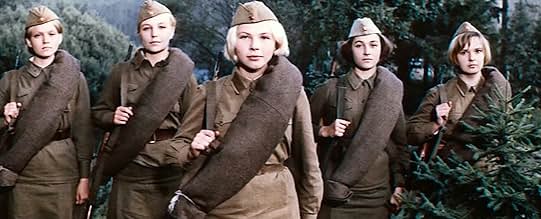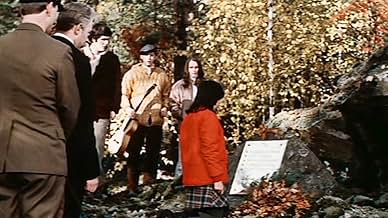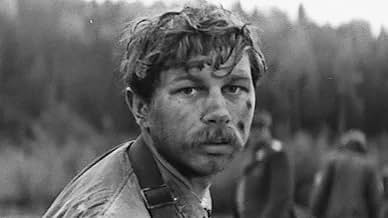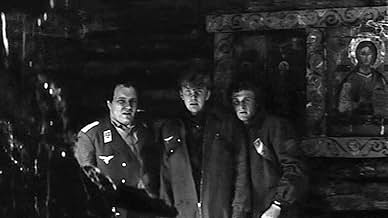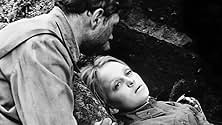IMDb-BEWERTUNG
8,0/10
5095
IHRE BEWERTUNG
Füge eine Handlung in deiner Sprache hinzuDuring World War II in a small village outpost, a Soviet sergeant has his troop replaced by an all female unit. As they finally begin to appreciate one another, German paratroopers are spott... Alles lesenDuring World War II in a small village outpost, a Soviet sergeant has his troop replaced by an all female unit. As they finally begin to appreciate one another, German paratroopers are spotted nearby and the realities of war emerge.During World War II in a small village outpost, a Soviet sergeant has his troop replaced by an all female unit. As they finally begin to appreciate one another, German paratroopers are spotted nearby and the realities of war emerge.
- Regie
- Drehbuch
- Hauptbesetzung
- Für 1 Oscar nominiert
- 1 Nominierung insgesamt
Elena Drapeko
- Elizaveta Brichkina
- (as Elena Dropeko)
Lyudmila Zaytseva
- Kiryanova, starshiy serzhant
- (as L. Zaytseva)
Alla Meshcheryakova
- Mariya, khozyayka kvartiry
- (as A. Meshcheryakova)
Nina Yemelyanova
- Polina Egorovna
- (as N. Emelyanova)
Aleksey Chernov
- Tovarishch 'Tretiy', mayor
- (as A. Chernov)
Viktor Avdyushko
- Pomkomvzvoda
- (as V. Avdyushko)
Svetlana Borisova
- Zenitchitsa
- (as S. Borisova)
Andrey Gribushin
- Soldat SS
- (as A. Gribushin)
Vladimir Ivashov
- Gost Brichkinykh
- (as V. Ivashov)
Irina Kmit
- Zenitchitsa
- (as I. Kmit)
Igor Kostolevskiy
- Misha, abiturient
- (as I. Kostolevskiy)
Empfohlene Bewertungen
I saw this movie several times. First, I watched this movie when I was a kid. At that time it didn't say much to me. There isn't much war-film stuff in it: except for some air-raid attack-counter-attack scene at the beginning and several shots in the second part of the movie. Last time I watched the movie, I was more knowledgeable about WWII and conscious about the calamities it brought to my country. My grandmom's favorite movie, as my Dad says, "A zori zdes' tihije", conveys more than Soviet propaganda wanted it to do. This movie greatly explores people's lives and destinies in a war period. It asks with passion:"How can we live an everyday life in an extraordinary time, the war proves to be."
A zori zdes tikhie (1972) ...aka The Dawns Here Are Quiet - is an honest, realistic and very fine Soviet War film which is sadly un-known to the Western audiences. It was directed by a very talented director Stanislav Rostotsky who also made two of my favorite films, Belyy Bim - Chyornoe ukho (1970) ... aka White Bim Black Ear and Dozhivyom do ponedelnika (1969) aka We'll Live Till Monday .
Rostotsky chose perfect cast - the young and unknown performers who all shone in his movie. I also highly recommend the book by Boris Vasilyev of the same title - I still remember the day when I first read that rather short but unforgettable story about five young girls and their corporal Vaskov who was much older and who was not used to deal with the women-soldiers. What started as a comedy, soon became a compelling and gripping drama depicting an unequal fight of the group of five women and their leader against 16 Nazi paratroopers, specially trained and deadly dangerous that penetrated deep beyond the front-line.
Rostotsky chose perfect cast - the young and unknown performers who all shone in his movie. I also highly recommend the book by Boris Vasilyev of the same title - I still remember the day when I first read that rather short but unforgettable story about five young girls and their corporal Vaskov who was much older and who was not used to deal with the women-soldiers. What started as a comedy, soon became a compelling and gripping drama depicting an unequal fight of the group of five women and their leader against 16 Nazi paratroopers, specially trained and deadly dangerous that penetrated deep beyond the front-line.
As I was working on a project on Soviet women in WWII, this movie was suggested to me by one of my professors who is a Russian herself. I was totally expecting some elaborate, romantic story, but I found the movie to be very realistic and consistent with my own research. This movie definitely highlights some of the general experiences and emotions felt by Soviet women soldiers at this time. I also enjoyed the many cultural references, for example to the film Tsirk. This film is a great tribute to all those soldiers who died in World War II, especially the women who I will never forget. I highly recommend this movie to anyone with any interest in Soviet history or WWII history.
Based on the Novel by Boris Vasilyev and written/directed by acclaimed Russian film-maker Stanislav Rostotsky; The Dawns are Quiet Here is a quintessential Soviet war film (nominated for Best Foreign Language Film at the Oscars in 1972). Produced in the 1970's, filmed in black and white, released amongst a fusilladed period of patriotic Soviet war films, The Dawns Are Quiet Here preserves kindred history with dignity and represents female soldiers of the Red Army with merit.
The Dawns is a small Anti-Aircraft company in the Quiet Karelia Soviet district during the Second World War. Browned-off with the Companies ill-disciplined, drunken, fraternising behaviour, the Soviet big-wheels replace this rag-tag company with an all-female company. Warrant Officer Vaskov struggles commanding these teenage-girls. The spirited all-female company; dance, dream, rebel, co-operate and tease like young girls do. Brazenly, in one scene take a fully-naked communal traditional Russian steam-sauna together (you did not get racy scenes like that in: The Longest Day!!) However, when these spirited girls are called into action they are no mitten floppers and seriously kick some Nazi ass with those ack-acks! In one scene mercilessly shooting a descending German fly-boy who has parachuted.
After one of the women discovers two German soldiers in the forest nearby, Vaskov leads five of his female group to go and capture them. Unfortunately this leads them to a larger than expected German Elite Paratrooper platoon. The six under-equipped Russians have to be quick-witted to survive and prevent them from making headway. Demonstratingly, Vaskov learns to respect them as soldiers.
The Dawns Here Are Quiet is a film of two halves. The first sets the scene and introduces us to the girls and their backstories. The backstories are surreal and very noticeably 1970's in cinematic tone(the only segments of the film that are filmed in colour). Bizarrely, it took me several dreamy flash-back scenes to realise they were individual characters back-stories. Disjoined as they were, If I had left the room and returned during one of these scene, I could be excused for thinking I was watching a different film altogether. The second act concerns their mission to hunt for the Hun. Rarely do we venture back to see the rest of the soldiers. There is a hammering shift in tone as the film remorselessly becomes a deadly pursuit in the marsh ridden Forest. The out-numbered girls, baptised under-fire display courage; the Sergeant displays consolation and many of the Elite German Paratroopers, as well as our young heroines are picked off one-by-one.
The Dawns Are Quiet Here is a sterling benevolent period soft-in-tone combat movie. Unsurprisingly, give the date of production it now feels that it belongs in a past era. I would recommend this authentic film to any dedicated Soviet film follower. Recommend it to anyone who is studying Russian history or The Eastern Front. And, recommend it to anyone possessing an interest of the Soviet Army during the Second World War. In addition, there is a fine frame-by-frame modern Russian television re-make of this film aired in 2014.
Unforgettably, The dawns Are Quiet Here pays merited honour, respect and admiration to the female fighters in the Red Army. In consolable, Many of these brave Russian GI Jane's were in their teens, early twenties or just beginning a family. Woefully, Countless numbers never returned home from the battle fields.
The Dawns is a small Anti-Aircraft company in the Quiet Karelia Soviet district during the Second World War. Browned-off with the Companies ill-disciplined, drunken, fraternising behaviour, the Soviet big-wheels replace this rag-tag company with an all-female company. Warrant Officer Vaskov struggles commanding these teenage-girls. The spirited all-female company; dance, dream, rebel, co-operate and tease like young girls do. Brazenly, in one scene take a fully-naked communal traditional Russian steam-sauna together (you did not get racy scenes like that in: The Longest Day!!) However, when these spirited girls are called into action they are no mitten floppers and seriously kick some Nazi ass with those ack-acks! In one scene mercilessly shooting a descending German fly-boy who has parachuted.
After one of the women discovers two German soldiers in the forest nearby, Vaskov leads five of his female group to go and capture them. Unfortunately this leads them to a larger than expected German Elite Paratrooper platoon. The six under-equipped Russians have to be quick-witted to survive and prevent them from making headway. Demonstratingly, Vaskov learns to respect them as soldiers.
The Dawns Here Are Quiet is a film of two halves. The first sets the scene and introduces us to the girls and their backstories. The backstories are surreal and very noticeably 1970's in cinematic tone(the only segments of the film that are filmed in colour). Bizarrely, it took me several dreamy flash-back scenes to realise they were individual characters back-stories. Disjoined as they were, If I had left the room and returned during one of these scene, I could be excused for thinking I was watching a different film altogether. The second act concerns their mission to hunt for the Hun. Rarely do we venture back to see the rest of the soldiers. There is a hammering shift in tone as the film remorselessly becomes a deadly pursuit in the marsh ridden Forest. The out-numbered girls, baptised under-fire display courage; the Sergeant displays consolation and many of the Elite German Paratroopers, as well as our young heroines are picked off one-by-one.
The Dawns Are Quiet Here is a sterling benevolent period soft-in-tone combat movie. Unsurprisingly, give the date of production it now feels that it belongs in a past era. I would recommend this authentic film to any dedicated Soviet film follower. Recommend it to anyone who is studying Russian history or The Eastern Front. And, recommend it to anyone possessing an interest of the Soviet Army during the Second World War. In addition, there is a fine frame-by-frame modern Russian television re-make of this film aired in 2014.
Unforgettably, The dawns Are Quiet Here pays merited honour, respect and admiration to the female fighters in the Red Army. In consolable, Many of these brave Russian GI Jane's were in their teens, early twenties or just beginning a family. Woefully, Countless numbers never returned home from the battle fields.
"In reality 4-5 unexperienced women and one man (even if he is a genial soldier) would have no chance again 16 Gebirgsjäger."
I very well understand how an implausible script could kill the effort of a good director and fabulous actors. I understand equally well that some would dismiss this film as mostly Soviet propaganda simply because the story of German paratroopers meeting serious resistance from just a few inexperienced girls does not ring true. Well, strangely enough, the film (and the novel) are fact-based. Of course, this is not a documentary and, according to Boris Vasiliev, there were no women in the actual group of militia men stopping 16 Gebirgsjäger on a mission to cause serious discruption to the Murmansk railway. But otherwise the story was true! For me, swapping old militia men and wounded soldiers for young girls is perfectly excusable.
Very touching and very Russian.
I very well understand how an implausible script could kill the effort of a good director and fabulous actors. I understand equally well that some would dismiss this film as mostly Soviet propaganda simply because the story of German paratroopers meeting serious resistance from just a few inexperienced girls does not ring true. Well, strangely enough, the film (and the novel) are fact-based. Of course, this is not a documentary and, according to Boris Vasiliev, there were no women in the actual group of militia men stopping 16 Gebirgsjäger on a mission to cause serious discruption to the Murmansk railway. But otherwise the story was true! For me, swapping old militia men and wounded soldiers for young girls is perfectly excusable.
Very touching and very Russian.
Wusstest du schon
- WissenswertesThe title is correctly translated to English (and most languages) as "The Dawns Here Are Quiet" yet for unknown reasons, the Finnish and Swedish titles translate to "And the Evenings Are Quiet".
- Alternative VersionenThe Australian VHS release of this film was released in two parts called "Side 1" and "Side 2".
- VerbindungenReferenced in Vozdukh (2023)
Top-Auswahl
Melde dich zum Bewerten an und greife auf die Watchlist für personalisierte Empfehlungen zu.
- How long is The Dawns Here Are Quiet?Powered by Alexa
Details
- Laufzeit3 Stunden 8 Minuten
- Farbe
- Sound-Mix
- Seitenverhältnis
- 2.35 : 1
Zu dieser Seite beitragen
Bearbeitung vorschlagen oder fehlenden Inhalt hinzufügen

